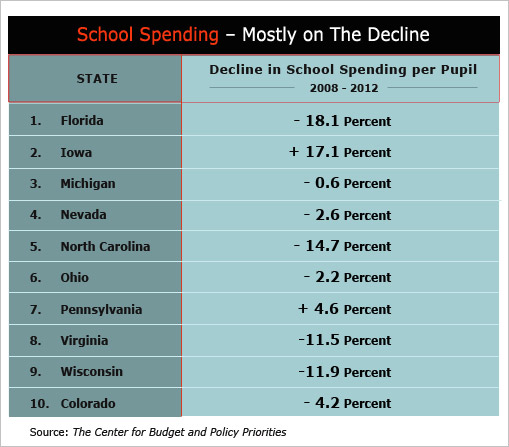Nearly all the top ten toss-up states in next year’s presidential election have sharply curtailed their education budgets since the recession began in 2008, a survey by the Center for Budget and Policy Priorities shows.
And with federal stimulus money evaporating, a new round of cuts to state and local budgets are in the offing. That could turn education into a major campaign issue next year, or at least one that roils the local waters where presidential politics will play out.
Republicans are seeking to turn the coming era of educational austerity into a virtue, claiming there’s no correlation between higher K-12 school spending and better test scores. They’re using the downturn to push for teacher accountability standards, which would eliminate teacher seniority rights during layoffs; expand charter schools; and roll back public employee wages and benefits, especially pensions.
“If states look at this as a way to really look at how education is structured, it can be seen as an opportunity,” said Chris Tessone, director of finance at the Thomas B. Fordham Institute, a conservative education think tank in Washington, D.C. “It’s a chance to be innovative, to rethink their staffing model. We see this new normal as an opportunity.”
Republicans governors in the swing states of Ohio and Wisconsin have jumped on the bandwagon, enacting far-reaching curbs on public employee teacher unions. But there are signs that the push to use fiscal austerity to cut education budgets, including those in local schools, is generating a backlash.

Democrats ousted two state senators in Wisconsin earlier this year. Next week, a ballot proposal that will repeal a law signed by Ohio Gov. John Kasich that ended public employee collective bargaining rights appears headed for an overwhelming victory.
Efforts to reduce funding for public education that some Republicans view as a failing system could wind up working in Democrats favor next year, some experts say, especially after the next round of budget cuts hits home and hundreds of thousands more teachers and other public employees get axed. Republicans in Congress have labeled the $35 billion earmarked in President Obama’s jobs plan for new aid to states a non-starter.
“George Bush neutralized the education issue with No Child Left Behind and compassionate conservatism,” said Richard Kahlenberg, a senior fellow at The Century Foundation. “Now the Republicans are calling for abolishing the Department of Education and retreating on education. It’s a real opportunity for the Democrats to reclaim the issue to their advantage.”
The budgetary pressures faced by schools in Ohio, where the measure repealing the curb on collective bargaining rights is up 25 points in the latest Quinnipiac poll, are typical of what is going on around the country. Education budgets were reduced just 2.2 percent over the last four years, largely because of money funneled to the state by the 2009 stimulus act.
But the two-year budget passed in June by the Republican controlled legislature will impose nearly $1 billion in school funding cuts over the next two years, which is about 3.3 percent cut a year. The next round of cuts in many of the state’s 613 school districts has already started. Teachers in some districts have already agreed to wage freezes; Cleveland eliminated spring sports; Dayton eliminated all-day kindergarten; and Medina has axed advanced placement science and math classes, French, German, art and music and instituted a $660 fee to play a sport.
The only option available to local school boards is to place property tax hikes on the ballot, which are already failing at a 50 percent rate, according to the Ohio School Boards Association. “When people are faced with the option of more layoffs of public employees, cuts in services or higher property taxes, they’re not going to be happy with any of the people that are in office,” predicted Howard Fleeter, a research consultant for the Education Tax Policy Institute in Columbus.“I don’t think they will distinguish between whether they are a Democrat or a Republican.”





